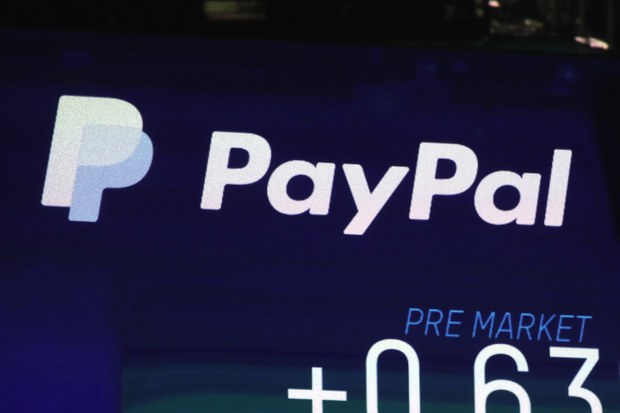Indonesia unblocks popular gaming sites, PayPal following public pressure
2022.08.02
Jakarta
 The PayPal logo appears on a screen at the Nasdaq MarketSite in New York’s Times Square, Oct. 3, 2018.
The PayPal logo appears on a screen at the Nasdaq MarketSite in New York’s Times Square, Oct. 3, 2018.
Indonesia’s communications ministry restored access to internet services on Tuesday including Yahoo, PayPal and some gaming platforms amid a public outcry and threats of street rallies, days after blocking them to enforce compliance with new government rules.
The ministry had given online platforms until July 20 to register to allow the government to monitor for prohibited content, or face bans. Activists criticized the rule as an affront to free speech.
“Access to four electronic system providers has been restored since 8:30 a.m. today,” said Semuel Abrijani Pangerapan, the ministry’s director general of information applications. He was referring to Yahoo and three popular Valve Corp. gaming platforms.
Semuel said communication with online providers led to the decision even though as of Tuesday, Yahoo and Valve – a U.S. game developer – had not registered on the ministry’s site.
PayPal, meanwhile, has committed to comply, Semuel said. Many freelancers who do work for companies in foreign countries rely on the service to receive payments.
On Sunday, the ministry allowed temporary access to PayPal for five days after it was blocked to allow users to withdraw their money and switch to another service.
Johnny G. Plate, minister for communications and information technology, said 66 major providers had registered including Google, Facebook, Twitter, Instagram and WhatsApp.
The ministry has said that the November 2020 regulation requiring registration is to protect domestic users from prohibited content defined as content that violates laws, causes unease or disrupts public order.
Under the regulation, platforms are required to comply with most content removal orders within 24 hours and within four hours for urgent requests to take down content involving terrorism, child sexual abuse images, or content that causes “unrest in society or disturbs public order.”
The regulation applies to companies providing online services and engaging in online businesses.
Required information includes a contact person to receive any request to remove content, the number of users and transactions from Indonesia, and a pledge to provide access including for law enforcement purposes.
Those who fail to comply could be given a written warning, temporary suspension, administrative penalties or see access to their platforms blocked, according to the ministry.
Freedom of information groups have warned that provisions in the regulation could infringe on citizens’ rights as they could be used as a pretext to ban critical speech.
Internet users had threatened to rally in front of the ministry’s building in central Jakarta to protest the bans while police threatened to arrest anyone who became unruly.
‘Benefits unclear’
Popular blogger Enda Nasution urged the government to review the regulation, saying there is no urgency to implement it.
“Any regulation should not disadvantage the public. It’s not clear what benefits the implementation of this rule will bring,” Enda told BenarNews.
Nenden Sekar Arum, head of the freedom of expression division at the Southeast Asia Freedom of Expression Network (SAFEnet), said banning online platforms was not a solution.
“Maybe now people affected by the bans are quite relieved because access to digital platforms has been restored. But that doesn’t mean the same thing won’t happen again on the basis of the ministerial regulation,” Nenden told BenarNews.
“We want the regulation to be revoked.”
Many of Indonesia’s 270 million people are prolific users of social media. Government officials in recent years have warned that terrorist organizations, including the Islamic State militant group, were using online platforms to spread propaganda and recruit young Indonesians.
In 2017, the government agreed with YouTube and Twitter to tighten monitoring by allowing selected users to flag material deemed as being linked to terrorism.
Since 2014, Indonesia has imposed the so-called Internet Positif program, which involves blocking pornographic websites and those with content deemed negative, including Reddit and Vimeo.
Critics have said because some sites that are generally considered harmless are also blocked, the program is akin to internet censorship.







